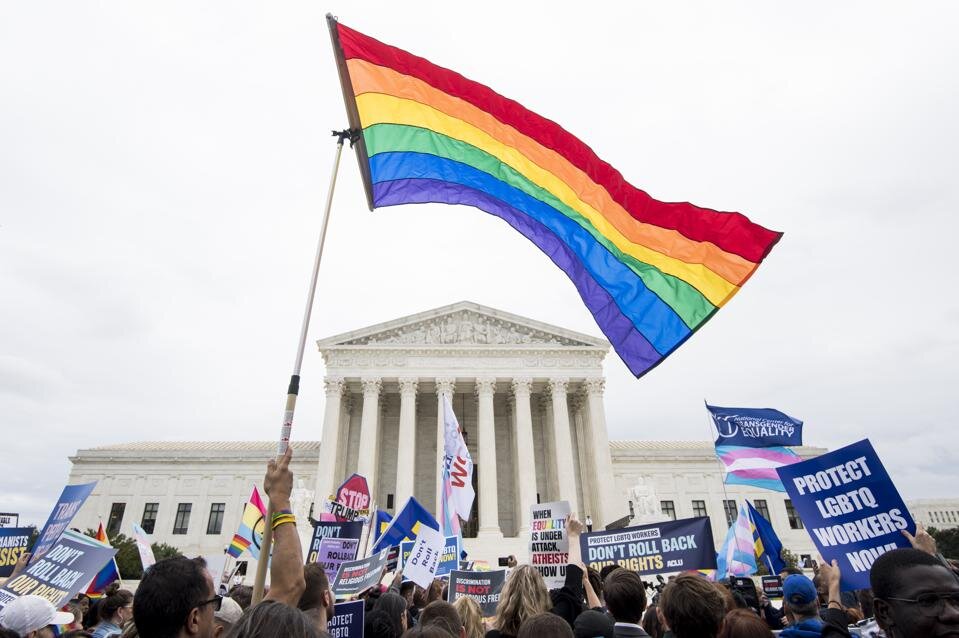LGBT Workers Gain Legal Status, But Will It Make A Difference?
CQ-ROLL CALL, INC VIA GETTY IMAGES
Supreme Court ruling clarified the Civil Rights Act of 1964 to explain that discrimination based on sex also covers discrimination based on sexual orientation and gender identity. The crux of the argument is that sex is inextricably linked with sexual orientation and gender identity. For example, if an employee is in love with a man, knowing that person's sex is critical to understanding what their orientation is. That's the only way to make the argument that they were fired because of who they love. Therefore, because those protections already apply, a new law is not required to provide protection based on orientation or identity.
There are many reasons to celebrate this ruling. It's a symbol of the things we value in this country: That no one should be punished for the way they were born or because of the way they live their life when it does not apply to fulfilling the core functions of their job.
But there's also a harsh truth about the ruling that many don't want to hear: These protections may not make much of a difference in the real world. If an employer wants to fire you, they can find a perfectly legal loophole to do so.
In the United States, most employees are employees at will. That means that their employer can fire them at any time, for any reason, or no reason at all. On the flip side, employees can quit at any time for any reason or no reason at all. It protects both parties.
When it comes to an employer getting away with wrongful termination, here's how it might play out. Say you get called into a meeting about your separation. You ask why it's happening. Your employer declines to offer you a reason why or offers a throwaway excuse like "we've decided to eliminate your position."
They haven't given you a reason that relates to your being a part of a protected class. That means that the onus is now placed on you, the terminated employee, to prove the reason you were let go was specifically because of your gender identity or sexual orientation. And your employer will do everything they can to provide evidence to the contrary if you decide to pursue legal action. They'll go through every project you're working on, every conversation you've had with a co-worker, and every email you ever sent from your corporate account with a fine-tooth comb to discover grounds for termination. When employers want to paint their employees with the worst-possible brush, they can generally find a way to distort reality to get there.
In one of the cases that came before the Supreme Court in this ruling, R.G. & G.R. Harris Funeral Homes Inc. v. Equal Employment Opportunity Commission, the reason for termination was not in dispute. The director of the funeral home who fired Aimee Stephens, the transgender woman who lost her job after six years of outstanding employment, admitted he did so specifically because she transitioned.
Funeral homes are typically small, family-run businesses without a human resources department to help them avoid lawsuits like this. However, the sad reality is that most organizations will approach it differently, working with their HR team to make sure things appear by the book. They would not outright admit anything related to the person being a part of a now-protected class and will find another plausible reason for the termination, or not give one at all. In doing so, the burden of proof shifts, and may be insurmountable in many cases.
Ultimately, this ruling is a step in the right direction. Every person should have the right to work without being in fear of being fired for who they are. But the sad truth is that the law isn't always an effective way to entice employers to do the right thing by their team. The only way to achieve that result is by humanizing the workplace, acknowledging that performance is not dependent upon the immutable characteristics a person is born.
But let's end on some good news: Most Americans agree with this ruling. According to the New York Times, 83% of Americans think it should be illegal to fire employees based on their sexual orientation, and 79% believe it should be illegal to fire someone for being transgender.
That means that even if the worst happens, and you are let go for either of those reasons while not being able to prove it outright, there are still an awful lot of businesses out there that will be happy to welcome you onto their team just as you are. And in the long run, working for a business that appreciates and values you will probably leave you better off (and happier!) anyway.


